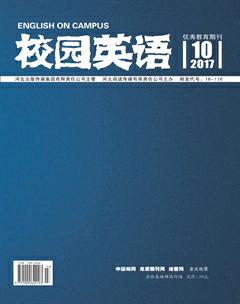Group Cooperative Learning in English Writing of Junior High Schools
刘晓
【Abstract】Group cooperative learning, a useful English teaching and learning strategy, has been widely applied in schools in China, or even in the world. For junior high school students, English writing is a quite difficult part in English learning. When group cooperative learning is applied in English writing, its challenging and efficient as well. So its really necessary to find out some ways to improve it.
【Key words】Group cooperative learning; English writing; junior high school
In the early 19th century, some American researchers began to study group cooperative learning and to apply it into practice. In 1880s, group cooperative learning has been widely used and improved in different subjects. In group cooperative learning, the English teacher divides one class into several groups according to each ones English level. And members of each group works as a whole to complete tasks given by the teacher. One student is graded according to his groups performance. In this way, more students take part in the class activities to make contributions to their own group. The atmosphere in class becomes more active and students ability gets improved by students learning together and helping each other.
Listening, speaking, reading and writing are four basic skills in English learning. Writing requires students comprehensive ability, so its usually harder to acquire writing skills than to get other skills. Most students think writing is very boring, because most writing classes are just teaching and learning, that is teachers introducing the writing theory, analyzing examples and then students finishing tasks. But in group cooperative learning, writing class is students-centered. Group cooperative learning is very useful and efficient in improving students writing skills.
1. The Wording and Phrasing Process
In the wording and phrasing process, group cooperative learning helps a lot. The English teaching contents and topics of junior high school are mostly about daily life, so its interesting for students to collect the main words and phrases of each topic. Take the unit 1 Whats the matter? of Go for it, G8A for an example. If the teacher wants to introduce the vocabulary in this unit, the teacher can firstly ask students to brainstorm the relative words about different parts of human body and phrases of different illnesses in groups. Competitions are encouraged among the groups to find out which group summarizes the most words and phrases and the winners can get the best score. In this way, every member will try their best to join the competitions to make their group win. Because to make their group win means to make themselves win. After the brainstorming, the teacher will find that students bring out more words than being expected. The teacher just guides students, helps them to summarize and supplements it. In the process, students express more, learn more, get more involved and become more active as well.
2. The Example Analyzing Process
In group cooperative learning, the example analyzing part is completed in groups. Not only excellent compositions can be examples, but the less excellent ones can also be examples. In the first step, two examples can be presented in front of each group. Members of each Group can discuss which one is better and why. In this way, students may know more about how to write better. During the process, the teacher need to lead the students to find out some rules which can identify good writings, such as words accuracy, the key points, sentences diversity, coherency, fluency and so on. In the end, the teacher leads the students to summarize the rules.
3. The Writing Process
In group cooperative learning, when one task is given, students firstly think about it and then it comes to group discussions. Through the discussion, students will decide the topic, the genre, the person, the tense, the key points and brainstorm the possible words, phrases and sentence patterns together. After that, students can begin to write carefully by themselves. Then, the teacher can find out a typical one to guide students do example analyzing. After that, peer assessment occurs between group members. Students help each other to find out the beautiful sentences and correct some mistakes as well. Rules are given during the example analyzing process. Then, students will try their best to perfect their writing again. Finally, the teacher will look through students writing again. This time, the teacher will not focus on the grammar mistakes, but pay much attention to the language skills, the contents, the organization and so on. The teacher should find out the shinning points in students writing to encourage them and also the inappropriate ones to find out ways to solve the problems in writing. At last, the teacher should choose a few excellent ones to display in the classroom.
After all the activities in group cooperative learning, its sure that students can achieve great progress in writing. Its also very important to think by oneself before group cooperative learning begins. In this way, group cooperative learning can be more efficient and writing can be better and better.
References:
[1]Sharan,S.1990.Cooperative Learning:Theory and Research[M].New York:Praeger Publishers.

